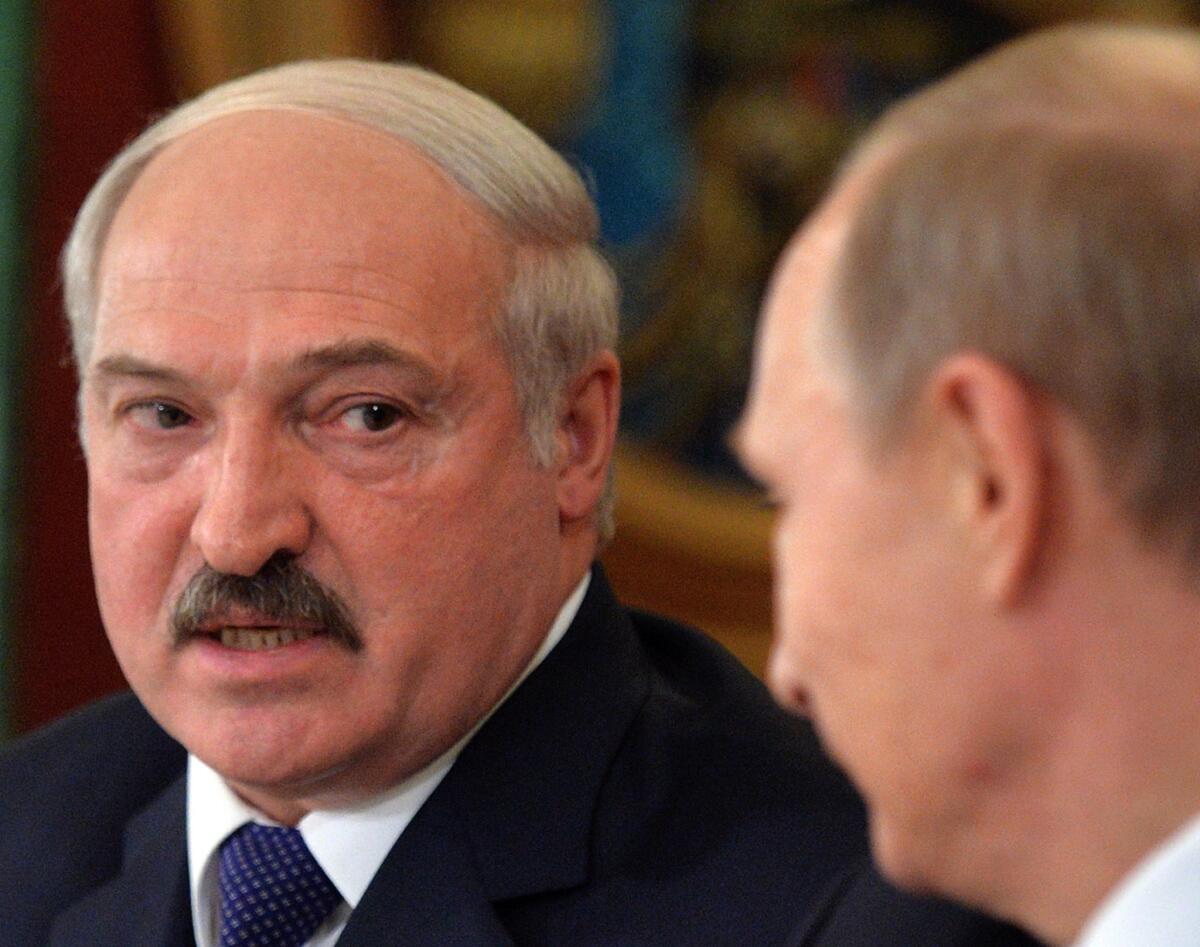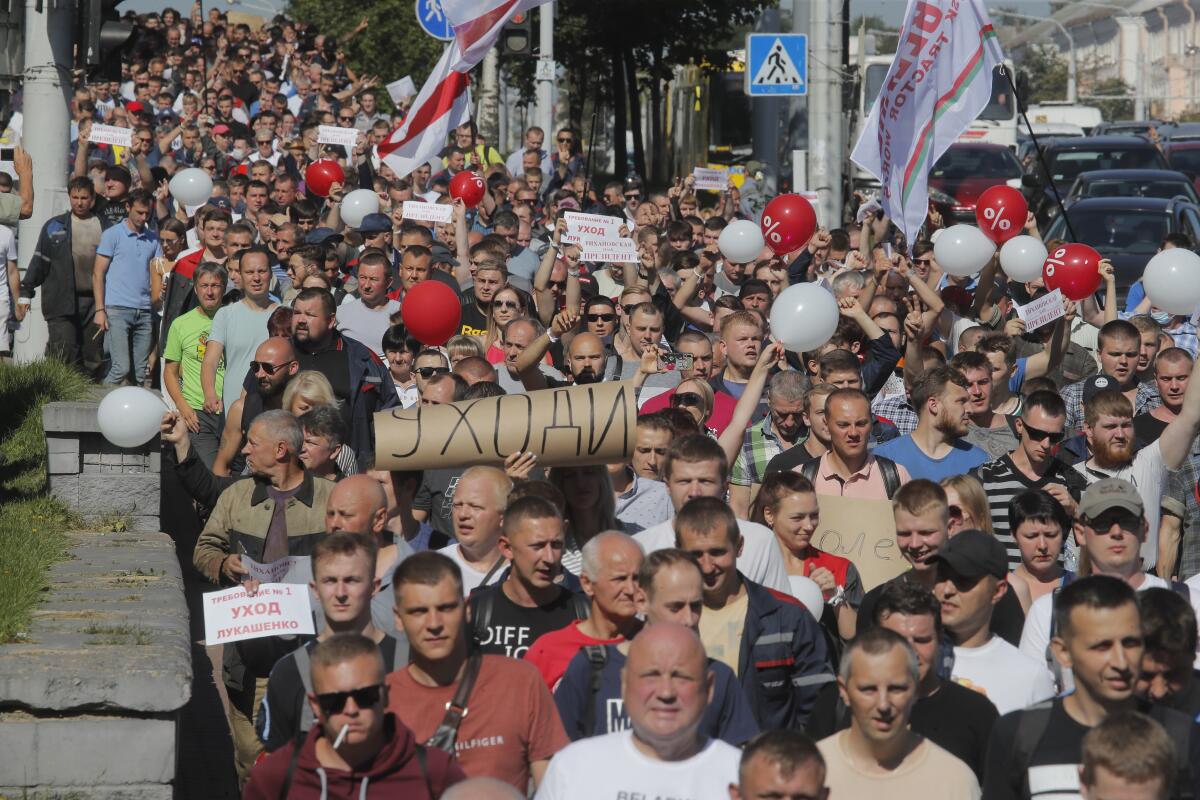Russia’s role looms as big unknown in Belarus turmoil

- Share via
Belarus, the onetime Soviet republic now beset by opposition protests, sits squarely between Russia and the West on a political seam that is dangerously fraying.
In an extraordinary session on Wednesday, European Union leaders rejected official results of an Aug. 9 presidential vote that handed a huge margin of victory to Alexander Lukashenko, an autocrat who has ruled Belarus for the last 26 years.
Declaring that the election had been “neither free nor fair,” the European Council president, Charles Michel, said the 27-member EU “stands in solidarity with the people of Belarus” who have taken to the streets in an unprecedented wave of protests.
But even while announcing targeted financial sanctions against officials who certified the false vote and carried out a brutal crackdown on protesters, the EU leaders did not directly call for a new election. Instead, they hedged, urging dialogue between the government and the opposition to foster a “peaceful transition of power.”
Such a scenario could ultimately result in Lukashenko’s ouster. But the calibrated European response suggested the bloc’s leaders want to avoid antagonizing Moscow to the point that President Vladimir Putin — who has a penchant for inserting himself into cross-border affairs and rousing Cold War ghosts — moves to intervene on the 65-year-old Belarus leader’s behalf.

The wish to avoid provoking Russia is widely shared by demonstrators taking to the streets in the capital, Minsk, and other Belarusian cities and towns, analysts say. The uprising is driven mainly by the desire to freely choose a leader, rather than any overarching effort to repudiate Russia and embrace the West, said Belarusian journalist and analyst Maryia Sadouskaya-Komlach.
“Belarusians consider themselves a European nation, no doubt, but don’t necessarily want to choose between that and good relations with Russia,” she said.
The events in Belarus are quite different from that in neighboring Ukraine, where the 2014 revolution that toppled authoritarian leader Viktor Yanukovich had a strongly pro-Western underpinning. Putin’s military intervention in Ukraine, including the seizure of the Crimean peninsula, triggered a crisis with Europe and led to the continent’s bloodiest ongoing conflict.
But even though Belarus is not Ukraine, this is a perilous moment.
The demonstrators are defiant and pressing for change. Opposition leader Svetlana Tikhanovskaya, in exile in neighboring Lithuania, said in a video message released Wednesday before the EU’s virtual gathering that Lukashenko had “lost all legitimacy in the eyes of the country and the world.”
Lukashenko, for his part, threatened Wednesday to unleash more force to suppress the protests. Thousands of demonstrators were arrested and at least two died in the turbulent days following the vote.
“There should no longer be any disorder,” the president said in remarks reported by the state news agency Belta, in which he seemed to be justifying a wider crackdown on “law and order” grounds. “People are tired. People demand peace and quiet!”
A central question now is how far Moscow is willing to go to shield Lukashenko, who at times has been a problematic partner. While pliant in many matters, the president, a big man with white hair and a dark mustache who has no qualms about locking up critics, has resisted the Kremlin’s efforts to deepen the union that already exists on paper with Belarus.
“Who knows what Putin wants?” said Joerg Forbrig, the director for Central and Eastern Europe for the German Marshall Fund. One option, he said, would be for Russia to support Lukashenko “come hell or high water” — including militarily, with all the risks that entails.
Another scenario, said Forbrig, would be for Moscow to tacitly allow his ouster, and set to work with a new president who would inherit a country heavily dependent on the Kremlin. “Russia has inroads in Belarus like nowhere else,” he said.
Lukashenko has clearly been trying to gauge his level of support from Putin. He has spoken with the Russian leader several times since the crisis erupted, and the Reuters news agency reported that a Russian government plane used in the past by the FSB security service flew to Belarus and back overnight.
The beleaguered Belarus president has resisted attempts by individual European leaders to defuse the crisis. German Chancellor Angela Merkel, in customarily brisk fashion, said she saw no role for herself as a mediator after Lukashenko rebuffed several attempts to contact him directly.
On Wednesday, Lukashenko and Moscow, in a plot line reminiscent of decades ago when the Iron Curtain divided Europe, again put forth a coordinated narrative that the protests are orchestrated by outsiders.
Kremlin spokesman Dmitry Peskov said interference in Belarus by unidentified foreign powers would be unacceptable. That coincides with Lukashenko’s own denunciation of “militants, weapons, ammunition and money from other countries” that he said were propping up the protests.
In a televised interview, Russian Foreign Minister Sergei Lavrov condemned what he called foreign attempts to capitalize on the unrest in Belarus. And he placed the protests in the context of what Moscow sees as its right to influence events in former Soviet republics, saying that the Belarus turmoil represented a “fight for the post-Soviet space.”
As tensions have grown, the United States has remained largely on the sidelines. President Trump said he might speak with Putin at an “appropriate” time about Belarus, but was vague when that might be. And unlike European leaders, he offered no expression of solidarity with the protesters.
“I like seeing democracy,” he told reporters at the White House on Tuesday. “It doesn’t seem like it’s too much democracy there in Belarus.”
By contrast, Democratic presidential nominee Joe Biden, who has promised a dramatically different approach to foreign affairs if he is elected in November, offered unequivocal support for the demonstrators, and a cautionary word for Putin.
“The brave citizens of Belarus are showing their voices will not be silenced by terror or torture,” Biden wrote Wednesday on Twitter. “Russia must be told not to interfere — this is not about geopolitics but the right to choose one’s leaders.”
More to Read
Sign up for Essential California
The most important California stories and recommendations in your inbox every morning.
You may occasionally receive promotional content from the Los Angeles Times.













